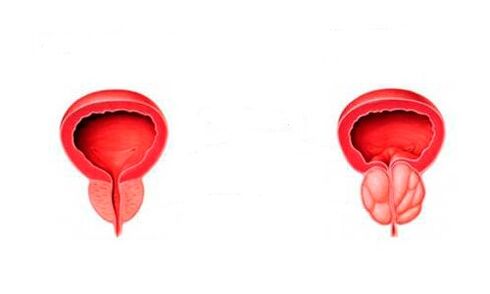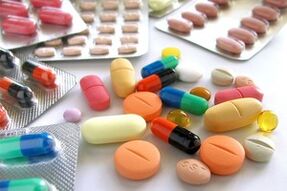Nowadays, prostatitis treatments are far from the last place in terms of the variety of assortments offered. And this is not in vain: prostate diseases are the most common among men with pathologies of the reproductive system.

Prostatitis is an inflammatory process of the prostate gland.
Most often, inflammation of this organ is manifested:
- Discomfort in the reproductive organs during or outside urination;
- Pain during ejaculation (ejaculation);
- Discomfort in the pelvis and external genitalia.
All of this leads to decreased activity and general well-being, emotional instability, and psychological disturbances. If these symptoms bother you, you should consult a specialist immediately.
A qualified urologist will conduct the necessary diagnostic methods and help cope with the disease.
While it should be noted that the healing process may take some time, it is easier to overcome minor dysfunctions of this organ than to start an irreversible process with fatal consequences, including prostate cancer.
General provisions of therapy

As mentioned above, prostatitis is an inflammatory process and, like any inflammation, it is most often caused by bacteria, so it is not surprising that the treatments for prostatitis are primarily antibacterial agents (antibiotics).
The next step in fighting the disease is nonsteroidal anti-inflammatory drugs. They have a positive effect by reducing swelling in the prostate gland by affecting the microcirculation of this organ. The goal of this line of treatment is to reduce venous swelling in the small pelvis.
Another important point of managing a patient with diseases of the reproductive system is to reduce the pain syndrome. In most cases (especially in chronic or complicated forms of the disease), the main complaint is pain, so the doctor should help the patient as soon as possible to deal with the extremely unpleasant sensations of the external genitalia.
The final stage is to prevent the development and recurrence of treatment complications in the future.

Here it is advisable to prescribe medical correction of immunity, vitamin therapy, recommendations for improving general health, which may include:
- Low-fat diet;
- Moderate physical activity;
- Stay in the fresh air;
- Adherence to basic rules of personal hygiene;
- Rejection of bad habits (smoking, alcohol);
- Scheduled medical examination in six months.
By following these simple rules, you can not only avoid complications, but also prolong your sexual activity.
Step One: Pest Control
Specialists conventionally classify antibacterial drugs for prostatitis into three main groups: fluoroquinolones, tetracyclines and macrolides, less often - cephalosporins.
Fluoroquinolones are considered to be the most effective in treating diseases of this organ due to their several characteristics:
- Has an effect on most of the microorganisms that cause disorders of the genitourinary system;
- Accumulates in glandular tissues, providing maximum effect on bacteria;
- Practically does not cause immunodeficiency after a course of therapy;
- Does not cause resistance (resistance of microbes to the action of antibacterial drugs of this class).
Other prominent members of this group of antimicrobial agents are tetracyclines and macrolides.
Long before the appearance of their improved companions, fluoroquinolones, these drugs contributed to bacterial dysfunction of the prostate gland. However, over time, microorganisms have become increasingly resistant to these two classes of drugs. In addition, these groups of medications have a fairly long list of side effects and contraindications.
It should be noted that any antibacterial drug can have a spermatotoxic effect, which the patient should be warned about in advance. It is not advisable to use antibiotics at least four months before the planned conception (full cycle of spermatogenesis).
Step Two: Reduce swelling
Prostate disease treatments that have a positive effect on the microcirculation have proven themselves well in the modern therapy regimen for prostate diseases. They promote the full supply of glandular tissues through the circulation of healing compounds, improve the outflow of secretions from the ducts of this organ, increase metabolic processes in cells, which generally helps the body cope with inflammation.
Among this group of drugs are non-steroidal anti-inflammatory drugs (NSAIDs). Most often, two forms of drugs in this series are used:
- Rectal suppositories - due to the local action of the drug, the effect is manifested relatively quickly, which reduces the frequency and duration of administration;
- Drops are taken inside. The course lasts twice as long as using rectal suppositories. It is prescribed 15 drops 4 times a day before meals.
To help the sick
Prostatitis medications, the main focus of which is immunocorrection and pain relief, are not specific. But they can still alleviate the patient’s fate and reduce the risk of re-inflammation.
To reduce pain, your doctor may prescribe painkillers orally (orally) or rectally (suppositories and microclimate). At the same time, taking pills gives a relatively short-term effect, but is more convenient to use.
Specific therapy
Recently, more and more prostatitis treatments have been prescribed that have a narrow effect on the body. All of them are united and act in glandular tissues, in parallel they have a beneficial effect on the cells of the body, increase their metabolism and the processes of restoration of functions.
Combination drugs are convenient to use, but do not forget about the commonly accepted treatment regimen for prostate inflammation. It is best to consult a specialist while taking this medication.
Hormone therapy for prostatitis
More and more often, preparations of male sex hormones are generally prescribed to treat inflammation of the prostate gland. But it is important to remember that they should be taken with extreme caution and make sure before the appointment that they are essential for the patient.
Patients with this disease have long noticed a decline in their quality of sex life. Among other things, such patients experience depression and apathy in the face of their sexual inferiority. Hormone therapy will help to cope with sexual dysfunction and improve the general condition of the person.
Urologist What medications do you recommend for recovery, do not forget that the main point in the treatment of any disease is strict adherence to the instructions and instructions of the doctor, early diagnosis and care for your health.
And despite the likelihood of recurrence, do not neglect prevention. Disease prevention is better than cure.































